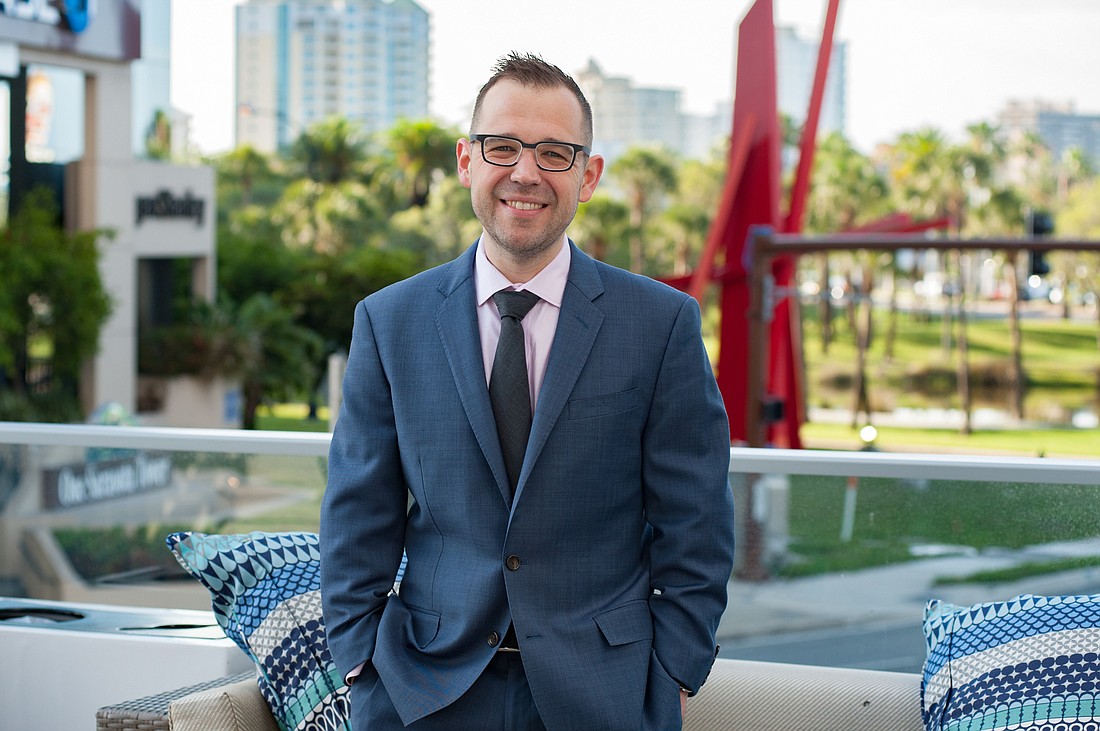- November 23, 2024
-
-
Loading

Loading

“The future economy will be driven by the rise of the creative economy.”
That’s one key message Steven Pedigo told attendees when he visited Sarasota recently to speak at the State of Talent Conference hosted by CareerSource Suncoast.
“I don’t think my advice for Sarasota would be that much different from any other city I’m working in, and that is No. 1, ensuring that the workforce is skilled to fuel the industries that you have here.” — Steven Pedigo, director of research and advising, Creative Class Group
Pedigo is director of research and advising for Creative Class Group, an advisory firm that provides what it calls “data-driven ideas to reach the Creative Class” on cities, urban issues and more. He’s also the director of the New York University Schack Institute of Real Estate Urban Lab.
Pedigo focuses on economic and urban development, city strategy and management, and placemaking. He works with a list of clients that includes companies, nonprofits, cities, universities and developers.
At the conference, Pedigo spoke about the economy’s shift from agriculture to industrial to creative and why cities need creative talent to drive them.
Before Pedigo spoke at the conference, he sat down with the Business Observer to talk about how communities can create creative, dynamic cities. Edited excerpts of the conversation:
Rise of Cities: “We’re more urban than ever before,” Pedigo says. “Here in the United States we’re about 80% urban. We’ve been urban for a while. But this return back to the urban core is something that’s really interesting.”
Urban Question: “It is a debate among folks in our field about what’s happening in terms of is it the suburbs, is it the second-tier cities, is it the mega cities?” Pedigo says. He says people are drawn to cities for a number of reasons reasons. “It is the amenity-rich places — places that have access to great restaurants, transportation, good schools, safety — all those things that really matter that define a quality place, which are what are attracting people.”
Square One: Pegido says cities have to get back to the basics of what drives economic development. “Places have to be innovative, they have to think about workforce and have conferences like this,” he says.
House Always Wins: “Everyone’s talking about affordable housing,” Pedigo says. “We think affordable housing is important. But we more importantly think that affordable rental housing is important. Partly because research and data has shown that knowledge economies require people to come in and out, and so having entry points into your city is really important. Not to mention service workers — firefighters, educators, teachers — those people get pushed out. And there are implications for that.”
Get Schooled: One of the key pieces of advice Pedigo has for Sarasota is to leverage the universities in the area. “I don’t think my advice for Sarasota would be that much different from any other city I’m working in, and that is No. 1, ensuring that the workforce is skilled to fuel the industries that you have here.” It’s about making sure universities help build a pipeline of workers. But it’s also crucial for universities and employers to be more embedded together, he says. “That, in my mind, is one of the biggest gaps in workforce development today. The two don’t really speak.”
Hospitable: Pedigo says because of Sarasota’s large hospitality sector, the city and employers should be considering whether enough hospitality jobs are being created that pay a wage that can support a family. He says to ask, “Can we think about upgrading some of those jobs?”
Make Plans: “One of the things that all cities need is an actionable economic development strategy,” he says. “Most cities and regions have comprehensive transportation and land use plans. We’re not required to have economic development strategies.” For cities of all sizes, he says, “You need not just a strategy but an actionable implementation plan.” It should include what the city is working on and why, plus what the city isn’t working on. He says, “A lot of cities don’t say ‘no’ enough.”
Challenge Accepted: “For me, what makes this so interesting is that every place is completely different,” Pedigo says. “Every place has its own assets and own challenges. But it’s about how you leverage the assets to fix some of the challenges.”